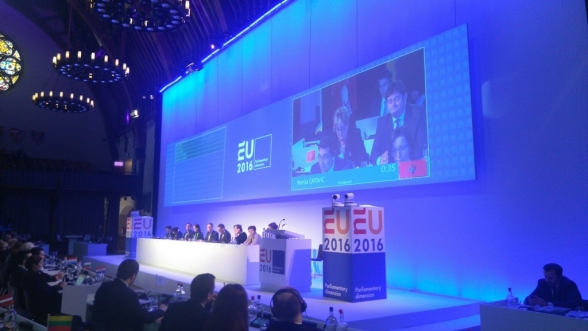In the framework of the Dutch Presidency of the EU Council, the Meeting of the Chairpersons of the Committees for Union Affairs of Parliaments of the EU was held in The Hague today. The meeting was focused on the topic of improving the role of parliaments in reaching decisions at the European level and strengthening their control mechanisms for the implementation of the EU regulations. In addition, key issues that Netherlands would deal with in the framework of the Dutch Presidency of the EU Council in the following six-month period were presented.
Ms Ankie Broekers-Knol, President of the Senate, welcomed the participants at the beginning meeting, saying that this type of the meeting, aimed at exchange of opinions on the issues of common interest, presented a useful platform for improving inter-parliamentary cooperation.
Mr Malik AzmanI, Chair of the European Affairs Committee in the Dutch Tweede Kamer, spoke on the importance of inter-parliamentary dialogue, stressing that migration crisis showed that there were challenges at the EU level, and that unity in searching a solution was not sufficient in itself, but it was necessary to put efforts in common actions.
The first session was focused on cooperation of committees for union affairs of national parliaments from the point of application of mechanisms to control the decision-making process at the European level, and the level of development of communication and cooperation of the committees with the European Parliament itself. Experiences of the French and Belgian parliaments regarding control mechanism were presented. With regard to that, the National Assembly of the Parliament of France regulated the issue of control by the resolution, while in Belgium, in line with parliamentary structure, federal and regional parliaments had their independent instruments of control.
The second session was devoted to priorities of six-month presidency. In line with that, the aim of the Dutch presidency is the Union focused on economic growth and opening of new jobs through innovations, but also the Union which cooperates with the civil sector. With regard to that, the Netherlands' Minister of Foreign Affairs Mr Bert Koenders underlined that the Netherlands would focus in the following six-month period on the issues of migration and international security, employment, strengthening of finance and Euro-zone, and climate changes and energy. On the other hand, the 2016 European Commission work programme has been adjusted to conditions of economic and migrant crisis and security issues as well. For that reason, Vice President of the European Commission responsible for the budget and human resources Ms Kristalina Georgieva stressed the importance of applying the prepared strategies aimed at auditing the budget and improving the unique market, developing the network for employment, but also those related to strengthening energy policy and reviewing the influence of climate changes.
Within the second session, Deputy Chairperson of the Committee on European Integration Ms Marija Maja Ćatović addressed the present. She spoke on the previous progress of Montenegro in negotiation process, reflected in opening of twenty-two chapters and temporary closing of two chapters. She thanked for the support of European institutions, welcoming the priorities of the current presidency country. She said that Montenegro was ready to make additional efforts in order to fulfil expectations related to achieving measurable results with regard to the implementation of the adopted laws, pointing out to the importance of maintaining regional cooperation through various initiatives, such as Berlin Process.
Aside from the Deputy Chairperson, MP Mr Danko Šarančić attended the meeting on behalf of the Committee on European Integration.
COSAC plenary meeting will be held in mid-June of the current year.









